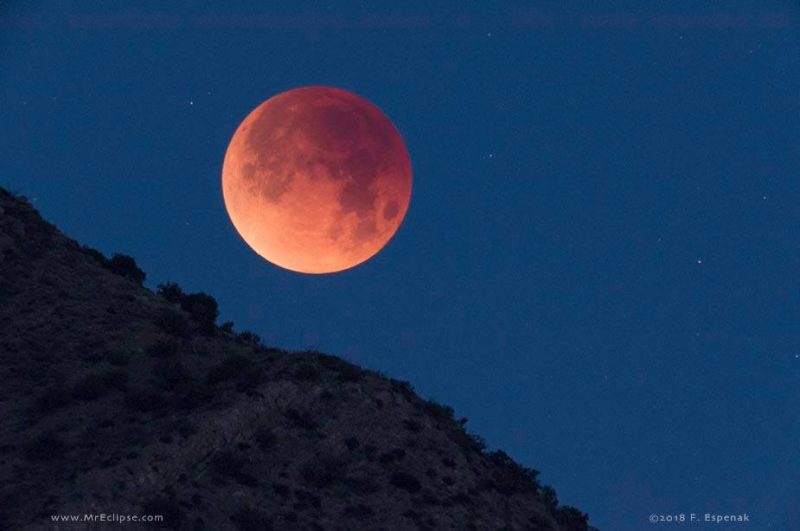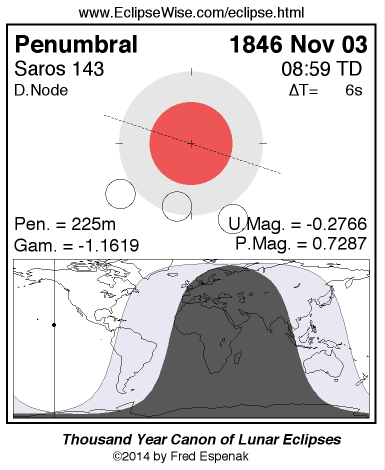
1st Election Day total lunar eclipse in US history
A total eclipse of the moon will fall on the upcoming Election Day in the United States, Tuesday, November 8, 2022. And folks on social media are already asking … how often does this happen? So, we looked back and learned that 2022 will feature the first total lunar eclipse on a regular Tuesday Election Day in U.S. history. And we found it won’t happen again until November 8, 2394.
If you live in the U.S., or elsewhere in North America, you can see the full moon pass through Earth’s dark shadow in the wee hours before sunrise on November 8. Eclipse details here.
While watching, or while voting on November 8, you’ll know that an Election Day total lunar eclipse is rare indeed. Read onward for the details…
How often is Election Day?
Before 1845, there was no Election Day per se in the U.S. Before 1845, a 34-day election period concluded on the first Wednesday of December. The total lunar eclipse of November 3, 1808, fell within this election period, though on a Thursday.
In 1845, the 28th U.S. Congress set the law stating that a U.S. federal Election Day must take place in an even-numbered year. And it must be on “the Tuesday next after the first Monday in the month of November.” That means Election Day always falls within the November 2 to November 8 time frame (on the Tuesday immediately following the first Monday in November).
For a lunar eclipse to fall on Election Day, the eclipse also must happen within the November 2 to 8 time frame, and on a Tuesday.
So, this year counts as extra special because a total lunar eclipse falls on Election Day (Tuesday, November 8, 2022).
Want to watch the November 8 eclipse? Click here
Election Day frequently asked questions, here
The last Election Day total lunar eclipse
As a matter of fact, before November 8, 2022, we find no other Election Day lunar eclipse in the previous part of the 21st century (2001 to 2021). Nor do we see an Election Day lunar eclipse in the 20th century (1901 to 2000).
In fact, we had to go all the way back to Tuesday, November 3, 1846, to find an Election Day lunar eclipse. But this November 1846 lunar eclipse wasn’t total. Instead, it was a rather shallow penumbral lunar eclipse, in which the full moon completely missed the Earth’s inner, dark shadow, and passed through the Earth’s outer, faint penumbral shadow.
In other words, this penumbral eclipse of the full moon on Election Day 1846 wasn’t noticeable to the eye. It’s likely only a handful of astute sky observers would have known about it and watched for it.
We did come across a total lunar eclipse that happened on a Tuesday, November 4, 1873. But 1873 wasn’t an Election Day lunar eclipse, since it happened in an odd-numbered year.
Before 1846, no other Election Day lunar eclipses took place, since the founding of the United States on July 4, 1776.
So, as stated above, the upcoming total lunar eclipse on November 8, 2022, will showcase the first Election Day total lunar eclipse in our nation’s history!

The next Election Day total lunar eclipse
After this year’s Election Day lunar eclipse, none are to be found in the remainder of the 21st century (2023 to 2100), and all of the 22nd century (2101 to 2200).
In the 23rd century (2201 to 2300), we find only one Election Day lunar eclipse. It’s on Tuesday, November 3, 2218. However, this is a partial – rather than a total – lunar eclipse.
We take note, by the way, that the partial lunar eclipse on Tuesday, November 3, 2218, takes place exactly 372 years after the penumbral lunar eclipse on Tuesday, November 3, 1846.
For the record, there’s also a partial lunar eclipse in the odd-numbered year 2245. It comes on Tuesday, November 4, 2245.
Again, we note the emerging pattern. This partial lunar eclipse comes exactly 372 years after the total lunar eclipse on Tuesday, November 4, 1873.
How do we know?
For our eclipse data, we examined Fred Espenak’s Six Millennium Catalog of Lunar Eclipses. We kept in mind that an Election Day lunar eclipse has to fall on November 2, 3, 4, 5, 6, 7 or 8.
Next, we needed to find out whether a particular date came on a Tuesday. We obtained that information from TimeandDate.com, entering the year to view that year’s calendar.
Bingo! All the criteria are met for an Election Day lunar eclipse in 2022. The lunar eclipse catalog lists the date of the lunar eclipse as November 8, 2022. On top of that, the timeanddate calendar shows us that the full moon and Tuesday both fall on November 8, 2022.
The 372-year Gregoriana eclipse cycle
Often, a lunar (or solar) eclipse recurs on the same date and same day of the week in periods of 372 years. This recurrence is known as the Gregoriana eclipse cycle.
Given that 2022 + 372 = 2394, we guessed that an Election Day lunar eclipse might be in the works for Tuesday, November 8, 2394.
Sure enough, after checking out our sources, a total lunar eclipse will next pair up with Election Day in 372 years, on Tuesday, November 8, 2394!

Bottom line: Tuesday, November 8, 2022, will bring the first Election Day total lunar eclipse in U.S. history. Assuming the U.S. system of voting stays constant, we won’t have an Election Day total lunar eclipse again for another 372 years. And that won’t be until Tuesday, November 8, 2394.
Want to watch the November 8 eclipse? Click here.
Total solar eclipse in North America, April 8, 2024.
The post 1st Election Day total lunar eclipse for US first appeared on EarthSky.
0 Commentaires